My office has arranged for a virtual fun event called Marqeta Talent Show where people can demonstrate their different talents in a festive manner. I thought of hosting a simultaneous chess show with some of my fellow players of Marqeta Chess Club. When someone joins Marqeta, they need to say what is their superpower, usually something funny or some passion that they cherish. When I joined Marqeta, I claimed my superpower as the ability to play chess in 10 boards in parallel with 10 opponents, making each move in less than 10 seconds and win all the 10 games! Of course, I am not that good, specially if 1 or 2 of the opponents are seasoned players then I have no chance. But then, a superpower is supposed to be flashy or funny. So I gave it a try. Our SVP Brian Keilly was hosting the All Hands and told me he wants to test my superpower. Well, it's not easy to arrange a simul like this and we decided we will figure out a way later. I remember every once in a while Brian would ask me - "Hey Ashik are you scared, you haven't given the test yet!" 😅So finally I thought this is the time when I can give it a try.
5 of my colleagues were interested to participate in that talent show. Very nice of them, thank you! Last afternoon we ended up playing as a group and here are the highlights from that session. I was at risk of losing in the game against Charles but managed to win all the games.
Game#1: Padma Muthuramalingam vs Ashik Uzzaman
Game#2: Artem Sholomytskyy vs Ashik Uzzaman
Game#3: Chandrasekaran Subramaniam vs Ashik Uzzaman
Game#4: Subrat Parida vs Ashik Uzzaman
Game#5: Ashik Uzzaman vs Charles Simms









